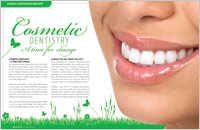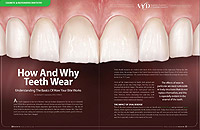We all know that brushing and flossing are essential for maintaining good oral hygiene, but did you know that starting your day with a meditation practice can also improve your oral health?
By taking a mindful approach to your morning routine, including meditation and developing good dental habits, you'll see visible improvements in your smile.
In this blog post, we will explore how morning meditation and oral care can work together to improve your oral health and provide tips for incorporating mindfulness into your morning routine.
Reduces Stress & Inflammation
Research has shown that stress can have a significant impact on your oral health. When you are under stress, your body produces cortisol, a hormone that can lead to inflammation throughout your body, including your gums. This inflammation can cause bleeding and even gum disease over time. Furthermore, stress can lead to teeth grinding or clenching, which can damage your teeth and lead to pain.
That's where morning meditation comes in. By setting aside just a few minutes each morning to practice mindfulness and meditation, you can reduce your stress levels and promote an overall sense of calm. This, in turn, can benefit your oral health by reducing inflammation and decreasing teeth grinding and clenching.
Slows down the Aging Process
As we age, our body goes through many changes, and our teeth and gums are no exception. Gum recession is a common dental problem that affects many adults. As you get older, your gums can progressively recede, causing tooth sensitivity, pain, and even the loss of teeth.
When you practice mindfulness breathing, you increase blood flow throughout your body, including to your gums. This increased blood flow delivers essential nutrients to your gums, promoting their health and vitality. It also encourages the growth and proliferation of new blood vessels, which can help your gums stay firm and healthy, reducing the likelihood of gum recession.
Lowers Risk of Gum disease
Gum disease is a common oral health condition that affects many people worldwide. It is caused by inflammation and bacterial buildup in the mouth, which can lead to gum recession, tooth loss, and other dental problems.
Meditation is an excellent tool for reducing stress levels, which is one of the primary causes of gum disease. By practicing mindfulness meditation, you can reduce stress levels and promote an overall sense of calm, which can help prevent inflammation and reduce your risk of gum disease.
Meditation is an effective tool for managing gum disease as it helps to reduce inflammation and bacteria buildup in your mouth. When you practice consistent meditation, you can improve your overall oral hygiene by developing good dental habits, such as brushing and flossing regularly.
Furthermore, meditation can help reduce bacteria buildup in your mouth, another primary cause of gum disease. When you meditate, you become more aware of your breath, which can help increase saliva production. Saliva is essential for washing away food particles and bacteria from your mouth, reducing the risk of periodontitis (advanced gum disease).
Incorporating Mindfulness into Your Oral Health Routine
In addition to reducing stress levels, consistent meditation practice can also help improve your dental habits, such as brushing and flossing regularly. Mindfulness encourages you to pay attention to your thoughts, feelings, and behaviors, allowing you to identify any unhelpful habits that may be contributing to your gum disease. You can then take steps to change these habits and develop new ones that promote better oral health.
To improve your oral health with mindfulness, try starting with a few deep breaths before beginning your oral care routine. Focus on the sensation of the toothbrush bristles in your mouth and the sound of brush strokes. Ensure that your jaw and neck muscles are relaxed so that you can brush at a leisurely pace. You can also focus on the sensations in your mouth, such as the taste and smell of the toothpaste and mouthwash. Incorporating mindfulness techniques can help take the focus off any discomfort or anxiety and provide a more enjoyable experience.
Conclusion:
In conclusion, a mindful approach to oral health can provide numerous benefits to your overall health and well-being. When you add meditation to your oral care regimen, you’re taking a proactive step to improve your health while simultaneously reducing stress, inflammation, and the risk of gum disease.
So the next time you're getting ready to brush and floss your teeth, take a few minutes to meditate and calm your mind. Your teeth and gums will thank you!
Related Cosmetic Dentistry Articles
 Cosmetic Dentistry – A Time For Change
Cosmetic Dentistry – A Time For Change
Join us as we review the myriad of possibilities available to you for cosmetic dental change. But the biggest part is not just how your smile looks, it's how you feel when you show it...
Read Article
 The Impact of a Smile Makeover
The Impact of a Smile Makeover
Americans are catching on to the emotional and social importance of a healthy, beautiful smile, and they're seeking out ways to improve their smiles. Learn why and what a change could mean for you...
Read Article
 Beautiful Smiles by Design
Beautiful Smiles by Design
The first in a series of articles dedicated to the "art and science" of designing a more appealing smile. One of the country's foremost leaders in cosmetic dentistry discusses how you and your dentist partner to create a great new look...
Read Article
 How And Why Teeth Wear
How And Why Teeth Wear
Are teeth supposed to last for a lifetime? And are humans designed to live for up to a hundred years? Given all the current improvements in the areas of medicine and health, both general and oral, people are not only living longer, but they are also keeping their teeth longer. This article will provide an overview of the "oral system" and one of its more common and important occurrences, tooth wear...
Read Article


